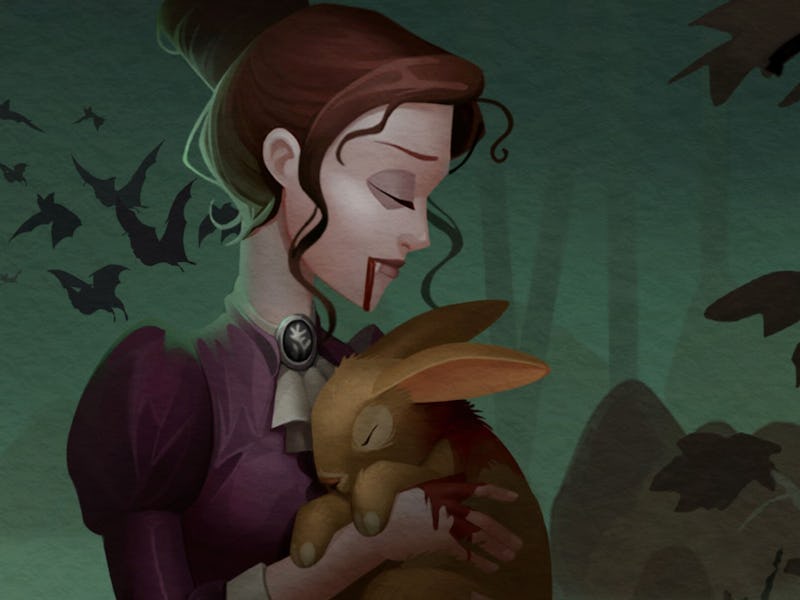Cabernet Explores Human Morality Through The Eyes Of A Vampire
Welcome to the afterlife.

Vampires have been staples of myth and fiction for hundreds of years, serving as cautionary tales and mirrors for the darkest human behaviors. So it’s a little surprising that we haven’t seen more RPGs, with their frequent focus on morality systems and complex choices, let players embody vampires. That’s changed with the release of Cabernet, a story-focused RPG that explores the difficulty of maintaining your humanity after you’ve become something more than human.
Liza Morozova awakens one night locked in a basement, before being freed by some unknown force and making her way upstairs to see an elegant party unfolding. By the end of this wildly confusing night, Liza realizes that she’s been turned into a vampire, and gotten a lesson in both how to use her newfound powers of transformation and hypnosis, and in the morality of the new world she’s entered into when a human is carelessly murdered and just as easily forgotten by her hosts.
Being a vampire does sound pretty fun, aside from all the blood.
In life, Liza was a doctor, and at the direction of the Countess, head of the local vampire clan, she’s sent to serve a fellow undead physician in a nearby town. Set in 19th-century Eastern Europe, Cabernet follows Liza through the first few weeks of her life as a vampire, assisting the doctor, exploring relationships in her new home, and satisfying her vampiric bloodlust while navigating the moral dilemmas brought about by feasting on her neighbors.
In place of typical RPG stats, Liza has scores in Literature, Art, Science, and History, representing the areas of her knowledge. Higher scores let the player select certain dialogue options, which usually endear Liza to who she’s talking to and occasionally lead to new quests or better outcomes for certain tasks. She also has scores in Humanity and Nihilism, representing whether she holds onto her human empathy or sees the living as little more than a food source.
Feeding on human blood is a necessary and morally complicated part of Cabernet.
These stats all determine Liza’s success in quests, but more important are her relationships with the locals. After her rebirth as a vampire, Liza finds herself in a town where mortals unknowingly mingle with vampires in their everyday life — or, every night, anyway. Players aren’t forced to maintain relationships with any of them, but getting closer to other characters unlocks new quests and storylines, from investigating the mystery of how a fellow vampire was turned to helping a piano teacher achieve her own musical dreams. That’s complicated by Liza’s need to drink blood to stay alive. At least once every few days, she’ll need to put a human who already trusts her into a trance to feed. While her victims don’t remember what happened, they wake up feeling distrustful of Liza, and there’s a chance they’ll perish from blood loss.
The balancing act between feeding and nurturing relationships is the trickiest part of Cabernet, and one that forces players into some tough moral quandaries. It’s possible to feed on your friends and have them walk away none the wiser, but it might be better to befriend people you don’t like in order to have a steady source of blood without the risk of hurting any you actually care for. By feeding too greedily, Liza also runs the risk of overindulging, which gives her a temporary boost to her stats, but also makes her need to feed more frequently afterward.
Cabernet is about more than short-term moral consequences, though. It’s interested in what exactly makes a vampire, and how much different they are from the humans they used to be. Is eternal life a gift or a curse? Do the powerful have an obligation to help the powerless? And is feeding on the living really so bad when the human ruling class is responsible for so much more misery than any vampire? Liza’s conversations with vampires and humans alike explore the political implications of undeath at least as much as the metaphysical ones, turning Cabernet into far more than a simple ghost story.
Liza’s relationships with her human neighbors are the core of Cabernet.
Cabernet’s story is fascinating and I found myself genuinely torn between my vampiric obligations and the desire to stay connected to my former humanity at times. It’s unfortunate that the game is somewhat soured by a fair number of bugs and other gameplay quirks. Interaction prompts can be finicky, only appearing when Liza is on the exact right spot on the screen, which led me to frequently activate the wrong item or conversation. That gets even worse in several timed sequences, where the biggest challenge was fighting with the game’s fussy positioning. Worse, I encountered a handful of bugged questlines, some of which left those quests unable to be finished.
Some elements of Cabernet are definitely janky, and I’m hoping patches sort that out quickly, because I’m already eager for another playthrough. Despite its faults, I found Cabernet’s story captivating, and even after trying to play as moral of a character as possible, I’m still left with some regrets about how I handled certain stories. If you’re looking for a game that’s deeply concerned with what it means to be a vampire in a world of humans, you’d be hard-pressed to do better than Cabernet, warts and all.